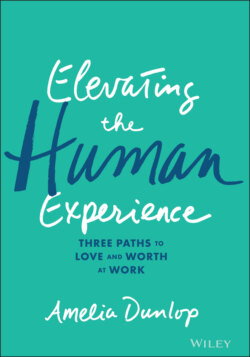Читать книгу Elevating the Human Experience - Amelia Dunlop - Страница 11
Love and Worth Research
ОглавлениеElevating the human experience is, necessarily, for all humans. It is not about elevating one group or identity above another or at the expense of another. It is not about unleashing someone's potential as a worker, because someone can show outward signs of success and not feel loved or worthy. It is not about “leaning in” to the system as it is today, which privileges Whiteness and maleness. “Leaning in” can imply that the problem is with the people for whom the system is not optimized: Black, Brown, women, members of the LGBTQ+ community, and all the ways these identities intersect. (As a side note, these labels of “White” or “Black,” “male” or “female,” serve to divide us from our shared humanity and shared need for love and worth. And yet they are also needed, so that we can really see each other and understand how our experiences differ as a result of the intersection of our identities.) Too often people are told that, to be worthy, they must work harder, show up as more perfect, and be willing to play the game as defined by the current system of rules. “Working twice as hard for half as much,” one gay Black friend put it. Elevating the human experience is about redesigning systems to be more human.
Over the course of this book, I will offer examples from the point of view of people who have been historically marginalized for any reason, because of their gender, age, physical ability, race, or sexual identity, so that we can see more clearly the need for something that is better, something that is elevated. I extend an invitation to you, my reader, to go on this journey with me to seeing yourself and seeing others as worthy of love at work. There may be times on the journey when you may feel uncomfortable along the way. I certainly do. I ask that you be open simply to noticing what may provoke discomfort. Pay attention to the discomfort before you move to dismiss it, disagree with it, or distract yourself from feeling it.
I write this book the only way that I can, with my lived experiences as a well-educated professional privileged White woman, who is a wife and a mother to two boys and a girl. I am aware that the only story I have the full right to offer on these pages is my own, and so much of what I will share is deeply personal. But, in addition to my own story, I will share the experiences of friends, colleagues, clients, mentors, and superiors. Out of respect for them, I do not attribute their names, except in places they have given me explicit permission to do so. I will share what my research team and I learned from the in-depth ethnographic interviews we conducted with more than 30 people, including a variety of areas of expertise inside and outside of work. And I will share what we learned from a 6,000-person quantitative survey of the US population. We set out to understand whether or not people felt loved and worthy in general, whether or not they felt loved and worthy at work, and whether or not it was important to them. We wanted to know if love and worth mattered in the workplace, and, if so, whether there were any differences among different members of the population. We designed the survey to examine the differences between those working and not working, those in corporate jobs and noncorporate jobs. We looked at the differences between men and women. We looked at differences in racial, ethnic, and gender identities. We looked at age differences. In short, we geeked out on the question of love and worth at work. (For our fellow nerds, the full survey design methodology and results are in Appendix A.)
Here are the biggest things we learned. Almost 90% of respondents agreed or strongly agreed that it “matters to feel worthy.” And yet, almost one out of every two respondents, sometimes, often, or always “struggled to feel worthy.” Almost 90% believe that their boss “sees them as a person, not just as an employee.” Yet, three out of four survey respondents “want their company to place more value on human worth.”
We learned that almost 80% of respondents want to “bring my whole self to work,” and yet 40% said there are “parts of my identity I need to ‘check at the door'” when it comes to work.
Similarly, almost 70% of respondents “want to be safe to be vulnerable at work,” while only about 40% currently “feel safe to be vulnerable at work.”
The picture was coming into focus. The majority of us believe that feeling worthy matters, but about half of us sometimes, often, or always struggle to feel worthy. I am among that half. We believe that we are seen as a person by our bosses, but want more value placed on our intrinsic human worth. We want to bring our authentic selves to work but many of us feel the need to check parts of ourselves at the door. And finally, we want to be safe to be vulnerable at work, but many of us do not currently feel safe to do so. Maybe, my research team and I realized, we really did have a worthiness gap in the workplace, an experience that is in need of elevating.
